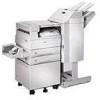Lexmark W820 Setup Guide - Page 102
Local printing, Token-Ring networks Shielded Twisted Pair use a DB9 - w820n
 |
UPC - 734646210508
View all Lexmark W820 manuals
Add to My Manuals
Save this manual to your list of manuals |
Page 102 highlights
- Token-Ring networks (Shielded Twisted Pair) use a DB9 connector. - Ethernet 10Base2 networks (Thin Coax) use a BNC T-connector. Local printing Note: All Windows operating systems support parallel connections. However, only the Windows 98/Me and Windows 2000 operating systems support USB connections. Some UNIX, Linux, and Macintosh computers also support USB connections. Consult your computer documentation to see if your system supports USB. You can attach your printer locally using either the standard USB port or parallel port. A USB port is standard on all Lexmark W820 printer models. We recommend Lexmark USB cable part number 12A2405 (2 m). The standard parallel port requires an IEEE-1284 compliant parallel cable, such as Lexmark part number 1329605 (10 ft) or 1427498 (20 ft). If you install an optional USB/Parallel Interface Card to the Lexmark W820n or Lexmark W820dn, you need a 1284 A-C parallel cable, such as Lexmark part number 43H5171 (9.8 ft), or a USB cable such as Lexmark part number 12A2405 (2 m). If you have installed an optional Tri-Port Adapter, you can locally attach the printer with a serial cable. We recommend Lexmark part number 1038693 (50 ft). For details on LocalTalk or infrared connections, refer to the documentation that shipped with the Tri-Port Adapter. 90 Attach cables















